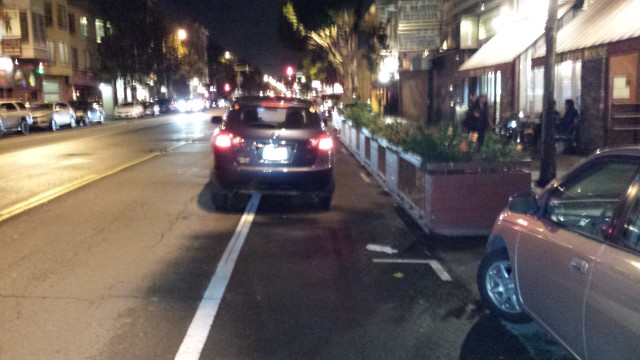Everyone’s talking about Uber’s latest problems with management style, sexual harassment, company culture … and CEO Travis Kalanick, who embodied all of that, has been forced out.
Big investors hope Kalanick’s resignation and a deep internal investigation will help position the company for an IPO. They want Uber to go public pretty soon, and all of these scandals are tamping down the stock price.

But there’s another interesting perspective on Uber (and Lyft, and some of the other tech disrupters) that has appeared not in The Nation, or Mother Jones, or 48hills but in the Harvard Business Review, the voice of the eminently establishment Harvard Business School.
Harvard Associate Professor Benjamin Edelman presents what sounds like a radical hypothesis, but it actually makes perfect sense. He says that Uber can’t be fixed, that the corporate culture was poisoned from the start – and that the only solution is for regulators to shut it down.
The company’s cultural dysfunction, it seems to me, stems from the very nature of the company’s competitive advantage: Uber’s business model is predicated on lawbreaking. And having grown through intentional illegality, Uber can’t easily pivot toward following the rules.
His analysis also applies to Lyft – and to Airbnb. These companies, he argues, are the equivalent of Napster – they’ve developed a useful new application of technology, but in the process violated a long list of existing laws. Now that the tech is out there, society needs to say: No, you can’t do this.
The end of Napster, which at this point most people agree was a rogue operation, didn’t mean the end of shared online music – we have itunes, and Spotify, and Pandora. The customer still gets the advantages – but the musicians get their royalties and the system that we have carefully evolved to protect the rights of artists hasn’t been completely destroyed.
Let me talk for a second about Napster.
Wow, that was cool: Just sign up and you’ll never pay for music again. The entire entertainment industry was torn up, which is what so many tech types want. Disruption.
And some good friends of mine, who were in bands that were what writers call “mid-list” – that is, not Kendrick Lamar or Bruce Springsteen, but popular enough that they could make a modest living selling records – were totally screwed.
Suddenly, record companies weren’t paying advances any more for mid-list bands to go into the studio and record (which takes time and money). Suddenly, unless you were a superstar who could sell out huge stadiums for live shows, you were out of luck. Suddenly, you couldn’t make new music anymore.
Yeah, startups got rich, and the already rich did fine – but ordinary working musicians saw a threat to their livelihoods. That has been the model for the tech industry: Disrupt and make quick cash for a few (already rich) investors and the lucky folks who found a cool app – but destroy the lives of tens of thousands of working people who had a decent middle-class life.
Napster was shut down; the entertainment industry has a lot of clout. The cab drivers of the world don’t.
Uber, Edelman notes, wasn’t the first to come up with the idea of offering rides through a smartphone app in private cars. That was Lyft. And Kalanick, who was doing a limo service at the time, was among the first to note that it was utterly illegal:
In a remarkable April 2013 posting, Kalanick all but admitted that casual drivers were unlawful, calling Lyft’s approach “quite aggressive” and “nonlicensed.” (After I first flagged his posting, in 2015, Uber removed the document from its site. But Archive.org kept a copy. I also preserved a screenshot of the first screen of the document, a PDF of the full document, and a print-friendly PDF of the full document.) And in oral remarks at the Fortune Brainstorm Tech conference in June 2013, Kalanick said every Lyft trip with a casual driver was “a criminal misdemeanor,” citing the lack of commercial licenses and commercial insurance.
More:
Given Kalanick’s statements, you might imagine that Uber would have filed a lawsuit or regulatory complaint, seeking to stop unfair competition from a firm whose advantage came from breaking the law. Instead, Uber adopted and extended Lyft’s approach. Others learned and followed: Knowing that Uber would use unlicensed vehicles, competitors did so too, lest they be left behind. In normalizing violations, therefore, Uber has shifted the entire urban transport business and set an example for other sectors.
No help from City Hall
When Uber and Lyft starting violating San Francisco’s law by running illegal taxis, I met with Chris Hayashi, who was the head of the city’s taxi commission. We sat in her office and she showed me a pink Lyft mustache that she’d bought online. Anyone could buy one, she said; anyone – including criminal predators – could pretend to be a cab driver.
There were reasons that the city had regulations about who could drive a taxi. Uber and Lyft were breaking those rules every single day, with impunity.
In an interview with the Examiner after she left her job, she noted:
Here I am, trying to steer the Titanic and someone hits me over the head with a baseball bat, is pretty much what the TNC issue is like,” Hayashi said. “We were about to clear, and all of a sudden here comes billions of dollars of venture capital for people who are willing to break every law in the book.”
She had no support in the Mayor’s Office, where Gavin Newsom and then Ed Lee were all about supporting tech innovations, no matter who got hurt.
I called Edelman, who has both a law degree and a Ph.D. in economics from Harvard, last week and we talked for about half an hour. He told me that the most common tech-industry response to his arguments is that the laws these companies are breaking were bad laws anyway, and that consumers were better off with Uber and Airbnb.
“But a lot of laws weren’t written just to protect buyers and sellers, but to protect third parties,” he said. Car-safety and pollution regulations aren’t just in place because they’re more convenient for drivers, many of whom would never voluntarily pay for them.
“Suppose you go into a parking lot and there are six handicap spots, and nobody is using them, and you are only going to be there for five minutes,” he said. “As an individual, you might say it’s dumb for all those parking spaces to not be available to you. But you still can’t park there.
“There might be conditions – a perfect, flat highway – where it would be safe for me to drive 95, but I still can’t.”
Edelman has been researching hotel fires from the 1940s, when large fatalities weren’t uncommon. “There are reasons that we put in place laws to protect strangers,” he said. “There are reasons hotels have extra exits, sprinklers, bedding that’s more fire resistant. Those rules are basically wise. And Airbnb would prefer to get rid of them.”
Nobody, Edelman says, “wants to pay extra for safety precautions. But if your taxi service doesn’t include a surcharge for wheelchair cabs, then there aren’t going to be any wheelchair cabs.”
A climate of lawbreaking
Edelman argues that allowing one or two companies to break that law is “contagious.” Which is exactly what’s happened in San Francisco.
In the past few years, under Mayor Lee, we have had a climate of consistent, repeated lawbreaking on a level that’s hard to imagine – and was almost never reported in the mainstream news media.
Landlords violated zoning laws to replace industrial jobs with tech offices – with impunity. Airbnb convinced more than 6,000 people in San Francisco to violate the short-term rental laws, every single day – and nobody did anything about it.
Tech companies on the Peninsula chartered private buses that parked in public Muni stops, where ordinary mortals would get a $275 ticket – and City Hall under Ed Lee had a “handshake deal” to look the other way.
Is it any surprise that landlords evict tenants for bogus “owner move-in” claims? Why not? This city never enforces its laws anyway.
Napster wasn’t legislated out of existence – what it was doing was already illegal. When the lawsuits started piling up, though, the company’s assets were soon less than its liabilities.
Edelman suggests that every city where Uber has illegally run taxis (and the same could be applied to Airbnb) should file suit and seek $1,000 in damages for every unlawful ride. That would be enough to force the companies to shut down.
It wouldn’t be the end of the model they have developed; it would just leave room for a service that follows that same model to do it legally.
The result wouldn’t be a cheap as Uber (or Napster) – but he argues that all of us, society as a whole, would be better off.
But making society better off doesn’t seem to be a part of the — yeah, let’s just say it — uber-capitalism that has been driving public policy in this city. It’s not just generic lawbreaking; it’s this idea that the rules don’t apply to the tech masters, because they are better than the rest of us. And that’s what needs to get disrupted.




